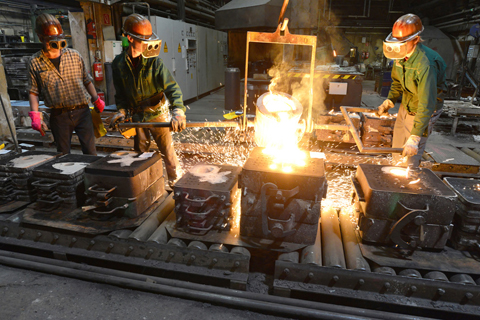UK Steel Industry faces green transformation with government support
by David Fleschen

The UK steel industry, long considered a cornerstone of the nation's industrial heritage, is at a critical crossroads. Beset by fierce global competition, excess capacity, and high domestic costs, the sector is struggling to remain competitive while facing the immense challenge of decarbonisation. The government's new Steel Strategy, set to be introduced in Spring 2025, offers hope for revitalising the industry, focusing on long-term investments and the transition to low-carbon steel production.
Secretary of State for Business and Trade, Jonathan Reynolds, underscored the government’s commitment to the sector, stating that "the decline is not inevitable" and emphasizing that the UK remains a "proud steelmaking nation, with a rich heritage stretching back to the Industrial Revolution." The upcoming Steel Strategy, he added, will ensure that steel can “adapt and grow tomorrow” despite the challenges it faces today.
The Struggles of the UK Steel Industry
In 2023, the UK produced 5.6 million tonnes of steel, representing a mere 0.3% of global steel production. This pales in comparison to countries like China, which accounted for over half of global production with 1,019 million tonnes. The UK’s eighth-place ranking among EU countries is symptomatic of an industry under strain, with domestic steel producers facing higher overhead costs, particularly in energy, compared to international competitors.
The steel industry also remains one of the UK’s most significant contributors to greenhouse gas emissions, responsible for 2.2% of the nation's total emissions. Decarbonising steel production, therefore, plays a pivotal role in achieving the UK’s net-zero targets by 2050. As Reynolds stated, “steel is essential to delivering on our net zero goals and building the next generation of green infrastructure.”
Government Support for Decarbonisation
The shift to greener steelmaking technologies is already underway, with Tata Steel leading the transition by closing its blast furnaces at Port Talbot in South Wales and replacing them with more environmentally friendly electric arc furnaces (EAFs). This transformation, however, comes at a significant human cost, with more than 2,800 job losses anticipated across Tata’s UK operations over the next three years.
Reynolds addressed these concerns directly, acknowledging the difficulty of the transition but highlighting the government’s role in securing "improved terms for those at risk of redundancy." He noted that the government has worked closely with Tata Steel and unions to secure "the most generous voluntary redundancy package" ever offered in a restructuring of this size, and employees will have access to training programs for new, in-demand skills in the local economy.
At the same time, Reynolds stressed that decarbonisation does not mean "deindustrialisation." He pointed out that at least 500 new jobs are expected to be created during the construction of the electric arc furnace at Port Talbot, adding that the government will continue to work with Tata Steel to explore further investment opportunities that could generate additional employment.
A New Era for UK Steel
The Steel Strategy marks a turning point for the industry, focusing on creating a sustainable, green future for steel production while also addressing pressing issues such as high energy costs. The government is investing £2.5 billion to support the industry, in addition to £500 million already allocated for Tata Steel’s transformation at Port Talbot. Reynolds emphasized that this funding aims to “create a more vibrant, competitive steel sector in the UK.”
To reduce the industry's energy burden, which has long hampered competitiveness, the government’s clean energy mission is central to the strategy. Reynolds acknowledged that high electricity prices have made the UK less attractive to international investors, but assured that “the government’s clean energy mission will ensure we are no longer exposed to the kinds of gas price shocks we have seen in recent years, helping British businesses to compete and win in the global market.”
The Steel Strategy will also include a review of the viability of Direct Reduced Iron (DRI) production in the UK, a key consideration in maintaining the country’s ability to produce primary steel. The government is working to ensure that the UK's steel sector can compete on the global stage, while simultaneously supporting its decarbonisation and future growth.
Source: Commons Library, Photo: Fotolia

